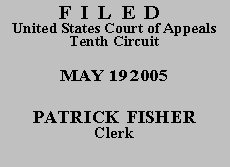

| MELVIN R. ORTIZ,
Plaintiff-Appellant, v. GALE A. NORTON, Secretary of the Interior; UNITED STATES FISH AND WILDLIFE SERVICE; UNITED STATES OF AMERICA, Defendants-Appellees. |
|
Plaintiff appeals from an adverse judgment entered after a two-day bench trial on his Title VII claims alleging national origin discrimination and retaliation by his former employer, the United States Fish and Wildlife Service, Department of Interior. The district court concluded that plaintiff, who was unable to obtain extended emergency leave when facing an imminent term of incarceration and was ultimately terminated, failed to prove by a preponderance that the actions complained of were the result of discriminatory or retaliatory motive. Ordinarily, we would review the district court's factual findings on the trial record for clear error and review de novo the legal conclusions reached based on those findings. See Keys Youth Servs., Inc. v. City of Olathe, 248 F.3d 1267, 1274 (10th Cir. 2001). But here plaintiff has failed to provide the trial transcript on which this review would be premised. As explained below, this omission requires us to affirm what is, in effect, an unreviewable determination.
It is the appellant's duty to ensure that we are provided with all transcripts required for "a complete and accurate record of the proceedings related to the issues on appeal." 10th Cir. R. 10.1(A)(1); see Fed. R. App. P. 10(b); King v. Unocal Corp., 58 F.3d 586, 587-88 (10th Cir. 1995). While some aspects of record preparation, such as designating and forwarding documents in the case file, are handled for pro se litigants by the district clerk, 10th Cir. R. 10.2(C), nothing in the rules relieves a pro se appellant of the duty to order and pay for transcripts required in support of the issues raised on appeal. And, as this court has emphasized numerous times, a party's pro se status does not as a general matter excuse noncompliance with basic rules of procedure binding on all litigants. Murray v. City of Tahlequah, 312 F.3d 1196, 1199 & n.3 (10th Cir. 2002); Nielsen v. Price, 17 F.3d 1276, 1277 (10th Cir. 1994); Green v. Dorrell, 969 F.2d 915, 917 (10th Cir. 1992).
When, as here, the issues raised by the appellant turn on or relate to the evidence presented at trial, the trial transcript is indispensable to our informed appellate review.(1) See, e.g., Scheufler v. Gen. Host Corp., 126 F.3d 1261, 1268-69 (10th Cir. 1997); United States v. Vasquez, 985 F.2d 491, 495 (10th Cir. 1993); Deines v. Vermeer Mfg. Co., 969 F.2d 977, 979-80 (10th Cir. 1992). Thus, once again, as "[t]his court has held 'on a number of occasions and in a variety of settings[,] . . . the lack of a required transcript leaves us with no alternative but to affirm.'" Morrison Knudsen Corp. v. Fireman's Fund Ins. Co., 175 F.3d 1221, 1238 (10th Cir. 1999) (quoting McGinnis v. Gustafson, 978 F.2d 1199, 1201 (10th Cir. 1992)).
The judgment of the district court is AFFIRMED.
Entered for the Court
Circuit Judge
*. This order and judgment is not binding precedent, except under the doctrines of law of the case, res judicata, and collateral estoppel. The court generally disfavors the citation of orders and judgments; nevertheless, an order
1. There is one facially fact-independent issue raised that may not entail any resort to the evidentiary record. Plaintiff objects that the district court "fail[ed] to address the 'retaliation issue.'" Aplt. Op. Br., Attachment to attached Pro Se Docketing Statement, at 5. If this were substantiated solely by reference to the district court's decision, we could order a remand for further proceedings on the neglected issue without the need to consult the trial transcript. But the objection is refuted by the second and fourth conclusions of law on page six of the district court's decision, in which the court acknowledges the retaliation claim, sets out the governing standard, and concludes that plaintiff failed to meet his burden (an evidentiary conclusion that we must accept for the reasons stated above).